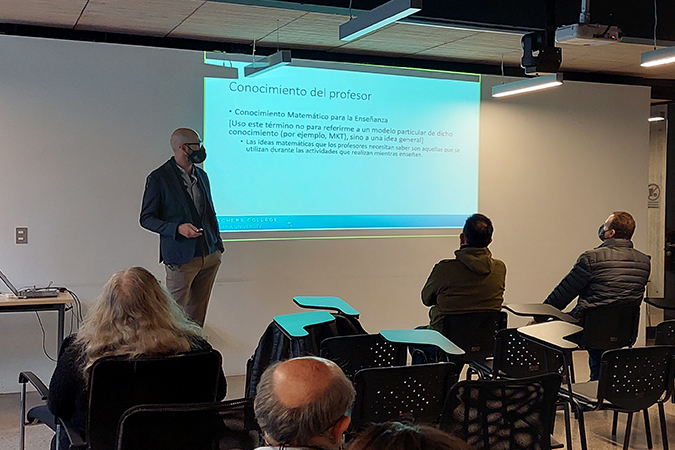Columbia University expert recommends three keys to improve math classes
June 29, 2022

Nick Wasserman, an academic at Teachers College of Columbia University, presented his project that seeks to improve teacher training with advanced mathematics courses. Connecting with teaching, inverted mathematical connections and pedagogical mathematical practices are part of the recommendations.
How to improve teaching Math classes from teacher training? Is the question you answered Nick Wasserman, PhD in Mathematics Education and professor of the Teachers College of Columbia University, in his hybrid talk "Improving the preparation of teachers through their advanced mathematics courses." The instance was developed in the Interfaculty Pedagogies Building for the UC Faculty of Education and had 25 face-to-face attendees and close to 65 people connected by Zoom.
Professor Nick Wasserman's visit is part of the Fondecyt project Support Fund for the Organization of Scientific Meetings and Interdisciplinary Seminars 2022 of the VRI, entitled "Advanced mathematical knowledge for the training of mathematics teachers" led by the academic of the Faculty of Education UC, Horace Solar. During the presentation, aimed at academics, researchers and mathematics teachers, the international expert explained how to improve teaching the students of middle education by preparing college courses
According to Wasserman, mathematics teachers at this level need a deep and solid knowledge of the content of the subject, as well as having sufficient pedagogical tools to apply them in the classroom. That sums it up in his collaborative project “Learning update for teachers in real analysis”ULTRA (Upgrading Learning for Teachers in Real Analysis in English), developed in conjunction with Temple and Rutgers universities, whose instructional approach shares three teacher preparation models through advanced math courses.
In his talk, Nick Wasserman revealed 3 keys, based on the results of the ULTRA project, to enhance mathematical skills in adolescents:
Connect with teaching
“There is a unique challenge in advanced math courses: mathematical ideas are not explicitly discussed with high school students.” Professor Wasserman pointed out, adding that “how to understand mathematics and how it is taught” must be changed. For this reason, he recommends an alternative model in which teachers can "learn pedagogical skills through the use of teaching situations", and where "certain pedagogical ideas can be learned through advanced mathematics".
Reversed Math Connections
The academic also pointed out that it is favorable apply reverse math connections; this types of classes seek to reorganize learning times and spaces. In an inverted class, the teacher gives the study material to the students before entering the classroom and disciplinary and participatory activities are carried out during the class. Nick Wasserman declared that two disciplinary practices such as define and prove "allow advanced mathematics to be considered as an instance of practice that is part of school mathematics", as opposed to the “typical math connection” model which focuses on content and leaves the teaching and understanding of advanced mathematics as something more general and abstract.
According to study Designing advanced mathematics courses to influence secondary teaching: fostering mathematics teachers' “attention to scope” made by the expert in 2019, the application of inverted mathematical disciplinary practices, such as attention to range and actual analysis with the inverted model, They were efficient in the classroom for the teachers. Also, according to the analysis, the 40% of high school students participated in these practices and most of them valued the technique teaching.
Pedagogical mathematical practices
Another important point for the academic is connect mathematical practices, defined as the activities carried out by mathematicians, with pedagogical practices, used by teachers, in Pedagogical Mathematics Practices (PMP). These contain common points between the previous ones, such as “the types of actions, habits, lines of reasoning, etc., in which mathematicians and teachers regularly engage”. In this sense, some PMPs are:
- Recognize and review assumptions and limitations mathematics (attention to range).
- Use special cases to illustrate ideas maths.
- expose the logic like the shape of mathematical interpretation.
- Use simpler objects to study more complex objects.
- Avoid giving rules without an explanation math to go with it.
- Look for multiple explanations.
The PMPs, he explained, make it possible to create a bridge "between knowledge of advanced mathematics and the actions of teachers." For this reason, he recommended that teachers specialize in these models to enhance the learning of mathematics in high school students.
You can download the exhibition material and revive the chat:
